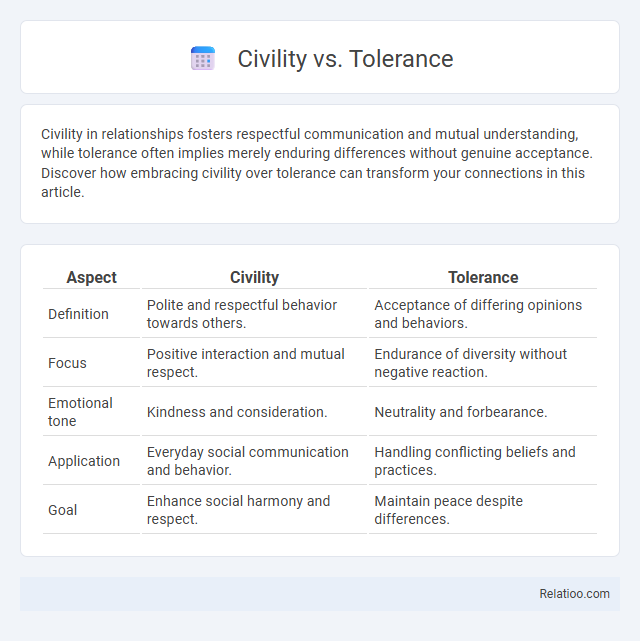Civility in relationships fosters respectful communication and mutual understanding, while tolerance often implies merely enduring differences without genuine acceptance. Discover how embracing civility over tolerance can transform your connections in this article.
Table of Comparison
| Aspect | Civility | Tolerance |
|---|---|---|
| Definition | Polite and respectful behavior towards others. | Acceptance of differing opinions and behaviors. |
| Focus | Positive interaction and mutual respect. | Endurance of diversity without negative reaction. |
| Emotional tone | Kindness and consideration. | Neutrality and forbearance. |
| Application | Everyday social communication and behavior. | Handling conflicting beliefs and practices. |
| Goal | Enhance social harmony and respect. | Maintain peace despite differences. |
Understanding the Concepts: Civility and Tolerance
Civility involves respectful and courteous behavior that fosters positive social interactions, while tolerance refers to the acceptance and allowance of differing opinions and behaviors, even if you disagree with them. Understanding these concepts helps you navigate conflicts by promoting peaceful coexistence without necessarily endorsing differing views. Both civility and tolerance contribute to creating inclusive environments where diverse perspectives are acknowledged and valued.
Historical Perspectives on Civility and Tolerance
Historical perspectives on civility reveal it as an evolving social code rooted in manners and respect, often tied to class structures and cultural norms since the Renaissance. Tolerance emerged as a philosophical and political principle during the Enlightenment, promoting acceptance of diverse beliefs and practices to foster social harmony and avoid conflict. The interplay between civility and tolerance over time reflects shifts in societal values, where civility emphasizes polite conduct while tolerance prioritizes coexistence despite differences.
The Role of Civility in Modern Society
Civility in modern society serves as a foundational principle fostering respectful communication and social cohesion, distinct from tolerance, which implies passive acceptance, and from pluralism, which actively embraces diversity. It emphasizes mutual respect and constructive dialogue, enabling diverse groups to coexist peacefully while addressing disagreements with dignity. The role of civility is critical in mitigating polarization and sustaining democratic engagement by promoting empathy and understanding across differing viewpoints.
Tolerance: Beyond Mere Acceptance
Tolerance extends beyond mere acceptance by fostering respect and understanding among diverse groups, promoting coexistence in pluralistic societies. Unlike civility, which emphasizes polite behavior and social harmony, tolerance involves recognizing and valuing differences without imposing judgment or exclusion. This deeper engagement cultivates empathy and inclusivity, essential for sustainable social cohesion and conflict resolution.
Key Differences Between Civility and Tolerance
Civility involves respectful and polite behavior toward others, fostering a positive social environment, while tolerance refers to the acceptance of differences without necessarily agreeing with them. The key differences between civility and tolerance lie in civility's emphasis on active respect and kindness, whereas tolerance often implies a passive endurance of diverse views or behaviors. Your ability to practice civility encourages meaningful dialogue and cooperation, surpassing mere tolerance in building mutual understanding.
The Impact of Civility on Social Cohesion
Civility fosters respectful interactions and shared understanding, which strengthens social cohesion by creating a foundation of trust and mutual respect within communities. Unlike mere tolerance, which implies passive acceptance, civility encourages active engagement and consideration of diverse perspectives, enhancing collaborative problem-solving. By practicing civility, you contribute to a more harmonious society where differences are managed constructively, promoting social stability and collective well-being.
Challenges of Practicing Tolerance in Diverse Communities
Practicing tolerance in diverse communities often encounters challenges such as deep-seated prejudices, cultural misunderstandings, and implicit biases that hinder genuine acceptance. You may face difficulties balancing respect for differing beliefs while addressing behaviors that conflict with community values, leading to tensions and potential social fragmentation. Developing effective dialogue and education strategies is essential to overcoming these barriers and fostering a more inclusive environment where diversity thrives.
Civility and Tolerance in Public Discourse
Civility in public discourse involves respectful communication that acknowledges differing opinions while fostering constructive dialogue. Tolerance emphasizes accepting and allowing diverse viewpoints, even when they conflict with your own, without necessarily engaging deeply with them. Your ability to balance civility and tolerance can create a more inclusive and productive public conversation, minimizing hostility and promoting mutual understanding.
Promoting Civility and Tolerance in Education
Promoting civility and tolerance in education fosters a respectful and inclusive learning environment where diverse perspectives are valued and constructive dialogue thrives. Your role as an educator involves modeling respectful behavior and encouraging students to understand and appreciate differences, which reduces conflicts and enhances collaboration. Implementing programs that emphasize empathy, active listening, and cultural awareness strengthens the foundation for lifelong civil interactions and mutual respect.
Towards a Harmonious Society: Balancing Civility and Tolerance
Balancing civility and tolerance is crucial for fostering a harmonious society where respect and open-mindedness coexist, enabling diverse perspectives to thrive without conflict. Civility involves courteous behavior and mutual respect, while tolerance emphasizes acceptance of differences, even when disagreed upon, creating a foundation for peaceful coexistence. Prioritizing both civility and tolerance helps mitigate social polarization and promotes inclusive dialogue, strengthening community bonds and social cohesion.

Infographic: Civility vs Tolerance
 relatioo.com
relatioo.com